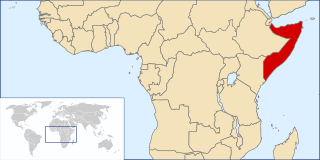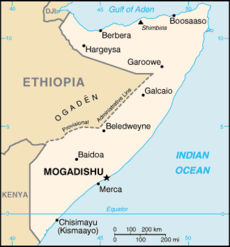
United Nations Security Council resolution 794, adopted unanimously on 3 December 1992, after reaffirming resolutions 733 (1992), 746 (1992), 751 (1992), 767 (1992) and 775 (1992), the Council "[expressed] grave alarm" regarding the situation in Somalia and authorised the creation of the Unified Task Force (UNITAF) to create a "secure environment for humanitarian relief operations in Somalia" in order to provide "essential for the survival of the civilian population". The current resolution determined that "the magnitude of human tragedy caused by the conflict in Somalia, further exacerbated by the obstacles being created to the distribution of humanitarian assistance [constitutes] a threat to international peace and security".
An arms embargo is a restriction or a set of sanctions that applies either solely to weaponry or also to "dual-use technology." An arms embargo may serve one or more purposes:

United Nations Security Council resolution 751 is a United Nations Security Council resolution adopted unanimously on 24 April 1992, after reaffirming resolutions 733 (1992) and 746 (1992) and considering a report by the Secretary-General Boutros Boutros-Ghali on the ongoing civil war in Somalia. The council established a United Nations Operation in Somalia I with an immediate deployment of 50 observers in the capital Mogadishu to monitor the ceasefire.

United Nations Security Council Resolution 1863, adopted unanimously on January 16, 2009, after recalling resolutions 733 (1992), 751 (1992), 1356 (2001), 1425 (2002), 1519 (2003), 1725 (2006), 1744 (2007), 1772 (2007), 1801 (2008), 1811 (2008), 1814 (2008), 1831 (2008) and 1844 (2008) on the situation in Somalia, the Council its intention to establish a peace-keeping force in war-torn Somalia and called on Secretary-General Ban Ki-moon to develop, by April 15, 2009, a mandate for the proposed mission, which would replace the existing African Union force in the country (AMISOM).

United Nations Security Council resolution 767, adopted unanimously on 24 July 1992, after reaffirming resolutions 733 (1992), 746 (1992) and 751 (1992), the Council noted the ongoing humanitarian efforts in Somalia by the United Nations and the deteriorating political situation in the country.

United Nations Security Council Resolution 1916, adopted unanimously on March 19, 2010, after recalling resolutions 733 (1992), 1519 (2003), 1558 (2004), 1587 (2004), 1630 (2005), 1676 (2006), 1724 (2006), 1744 (2007), 1766 (2007), 1772 (2007), 1801 (2008), 1811 (2008), 1844 (2008), 1853 (2008), 1862 (2009), 1894 (2009) and 1907 (2009), the Council extended the term of the Monitoring Group for 12 months and expanded its mandate to include the monitoring of the arms embargo on Eritrea in addition to Somalia.

United Nations Security Council resolution 1298, adopted unanimously on 17 May 2000, after reaffirming resolutions 1177 (1998), 1226 (1999), 1227 (1999) and 1297 (2000) on the situation between Eritrea and Ethiopia, the Council condemned continuing hostilities and imposed an arms embargo on both countries.

United Nations Security Council resolution 1343, adopted unanimously on 7 March 2001, after recalling resolutions on Sierra Leone and the region, including resolutions 1132 (1997), 1171 (1998) and 1306 (2000), the Council demanded that Liberia end its support for rebels in Sierra Leone and threatened the imposition of wide-ranging sanctions unless the country complied with the Security Council.

United Nations Security Council resolution 1407, adopted unanimously on 3 May 2002, after recalling resolutions on the situation in Somalia, particularly Resolution 733 (1992), the Council requested the Secretary-General to establish a team to assess requirements for an expert panel to monitor violations of the arms embargo against the country.

United Nations Security Council resolution 1474, adopted unanimously on 8 April 2003, after recalling resolutions on the situation in Somalia, particularly resolutions 733 (1992), 1407 (2002) and 1425 (2002), the council re-established a panel of experts to investigate violations of the arms embargo against the country.
United Nations Security Council resolution 1519 was adopted unanimously on 16 December 2003. After recalling resolutions on the situation in Somalia, particularly resolutions 733 (1992), 1356 (2001), 1407 (2002), 1425 (2002) and 1474 (2003), the council requested the establishment of a monitoring group to investigate violations of the arms embargo against the country.

United Nations Security Council resolution 1558, adopted unanimously on 17 August 2004, after recalling previous resolutions on the situation in Somalia, particularly resolutions 733 (1992) and 1519 (2003), the Council re-established a group to monitor the arms embargo against the country for a further six months.

United Nations Security Council resolution 1587, adopted unanimously on 15 March 2005, after recalling previous resolutions on the situation in Somalia, particularly resolutions 733 (1992), 1519 (2003) and 1558 (2004), the council re-established a group to monitor the arms embargo against the country for a further six months.

United Nations Security Council resolution 1596, adopted unanimously on 18 April 2005, after recalling all previous resolutions on the situation in the Democratic Republic of the Congo, including resolutions 1493 (2003), 1533 (2004), 1552 (2004), 1565 (2004) and 1592 (2005), the council expanded the arms embargo to include all recipients of weapons in the country, and imposed a travel ban and asset freeze on those violating the embargo.

United Nations Security Council Resolution 1972 was adopted unanimously on 17 March 2011. After recalling previous resolutions on the situation in Somalia, particularly resolutions 733 (1992), 1844 (2008) and 1916 (2010), the Council authorised an ease on its assets freeze relating to humanitarian operations in the country for 16 months.

United Nations Security Council resolution 1630, adopted unanimously on 14 October 2005, after recalling previous resolutions on the situation in Somalia, particularly resolutions 733 (1992), 1519 (2003), 1558 (2004) and 1587 (2005), the council re-established a group to monitor the arms embargo against the country for a further six months and condemned the increase in flow of weapons to the country in violation of the embargo.

United Nations Security Council Resolution 1676, adopted unanimously on May 10, 2006, after recalling previous resolutions on the situation in Somalia, particularly resolutions 733 (1992), 1519 (2003), 1558 (2004), 1587 (2005) and 1630 (2006), the Council re-established a group to monitor the arms embargo against the country for a further six months.

United Nations Security Council Resolution 1724, adopted unanimously on November 29, 2006, after recalling previous resolutions on the situation in Somalia, particularly resolutions 733 (1992), 1519 (2003), 1558 (2004), 1587 (2005), 1630 (2006) and 1676 (2006), the Council re-established a group to monitor the arms embargo against the country for a further six months and condemned an increase in the flow of weapons to the country.

United Nations Security Council Resolution 2002, adopted unanimously on July 29, 2011, after recalling resolutions 733 (1992), 1519 (2003), 1558 (2004), 1587 (2004), 1630 (2005), 1676 (2006), 1724 (2006), 1744 (2007), 1766 (2007), 1772 (2007), 1801 (2008), 1811 (2008), 1844 (2008), 1853 (2008), 1862 (2009), 1907 (2009), 1916 (2010) and 1972 (2011), the Council tightened sanctions against Eritrea and Somalia to include individuals and entities recruiting or using child soldiers in the Somali Civil War, in addition to those responsible for attacks against schools and hospitals in Somalia.
United Nations Security Council Resolution 1811 was unanimously adopted on 29 April 2008.















